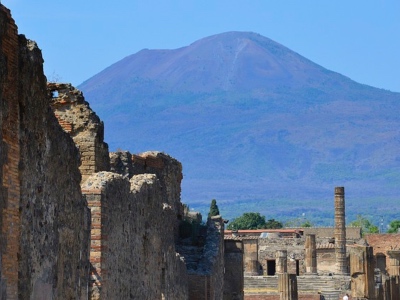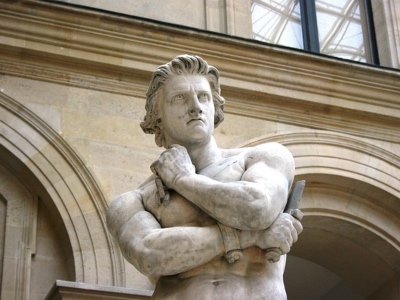From a professional fighter in the dusty sands of the gladiatorial arena to the glorious leader of a revolt that shook the entire Roman Empire: In the 1st century BC, gladiator and slave Spartacus started the Third Servile War and went down in history as a brave warrior and brilliant leader. Read on to find out how it all began, and whether the slave revolt succeeded – or was defeated.
During the 1st century BC, the Roman Empire had conquered many European peoples. In the course of their conquests, they took many prisoners – who they needed as slaves, for example. Roman society was indeed built on having a large number of unpaid workers without any rights, and on the Italian peninsula, historians estimate that around 30% of the population were slaves at the time.! Slaves in ancient Rome had hardly any rights – their owner could do what he wanted with them. Among the slaves, there was a special group that ranked at the bottom of society: the gladiators. Gladiators, often convicted criminals or captives of wars, were trained to be merciless fighters who had to fight for life and death in arenas for the entertainment of the people. In a special gladiator school, called “ludus” in Latin, the gladiators were trained. There were different types of gladiators who had to use and master different weapons. In the arena, for example, a murmillo with a gladius (sword) might have to compete against a hoplomachus with a sword and a spear. Even though gladiators could become famous heroes and only fought a few times per year, most of them died a cruel death in the arena.

Spartacus (around 103 – 71 BC) was one of these professional fighters, he was trained as a murmillo in the gladiator school in Capua. We don’t know much about his past, there are various accounts. He probably came from Thrace, and was either a prisoner of the Roman legion, or fought there and deserted or became a criminal – we are not sure of the actual reason for his enslavement. Finally, in 73 BC, he decided, together with his fellow gladiators, to put an end to this unfree and degrading way of life. Together with the others he devised a plan to get out of the gladiator school. These are usually heavily guarded, knowing how dangerous gladiators with access to weapons can be. But Spartacus and his comrades-in-arms took kitchen utensils like knives, and actually managed to defeat the guards with them and escape. Now, with real weapons, they could defend themselves better. They received more and more support, and gradually more and more join their group – until a real army had been formed. At first they retreated into the mountains – in the crater of the sleeping volcano Vesuvius they set up camp. In the meantime, Roman soldiers had blocked the access to the crater and were waiting for the slaves to come out of hiding due to lack of food. Spartacus, however, escaped this trap: the slaves knotted rope ladders made of vines and were thus able to climb a rock face at another location that was considered impassable. They surprised the Roman soldiers with an attack from behind – and got the victory. Many victorious battles and violence followed – the third Roman servile war was ongoing.

Some Roman historians describe that Spartacus then argued with Crixus, who was leading the group with him. Thus Crixus is said to have wanted revenge for his suffering as a slave and therefore called on the slave army to plunder and commit cruel violence against the civilian population, while Spartacus actually wanted to flee to the north. This conflict is said to have severely affected the community of the army, weakening them against the Romans. Today we cannot say for sure whether the conflict actually took place in this way. What is certain, however, is that they began to suffer one defeat after another and lost more and more fighters. Finally, the Romans became more and more threatening. However, Spartacus’ last escape plan to flee on pirate ships failed: the pirates betrayed them and Spartacus and his men found themselves surrounded by the Romans. Tragically, Crixus had already been killed before – and Spartacus now also had to face this fate in a final battle. Most of the slaves, although superior in number, met their deaths in this battle – the remaining 6,000 rebels were cruelly crucified in public by the Romans as a warning. Thus ended the third servile war – during these three years of violence a victory for the slave army had not seemed impossible.
Finally, one question remains: Was Spartacus a hero?
He was glorified by many as the liberator of the slaves. Yet we must not forget that we have no knowledge of his true objectives. Although he had the opportunity, he did not flee with his army and thus free himself and his fellow soldiers, but ending slavery throughout the Roman Empire was not his explicit goal either. We must also not forget the brutalities that Spartacus’ army committed against the civilian population. But what part Spartacus played in this, we cannot say for sure either.
In the end, he was nevertheless a gifted fighter, clever strategist and talented leader, even if he was defeated. What is your opinion: Can he be called a hero?
References:
- https://en.wikipedia.org/wiki/Spartacus – Wikipedia, accessed 06/07/2023
- https://www.britannica.com/biography/Spartacus-Roman-gladiator – The Editors of Encyclopaedia Britannica, Encyclopaedia Britannica, 23/06/2023
- https://de.wikipedia.org/wiki/Spartacus – Wikipedia, accessed 06/07/2023
- https://www.geo.de/geolino/mensch/17817-rtkl-altes-rom-spartacus-kampf-gegen-rom – Fenja Mens, GEOlino, accessed 06/07/2023
- https://www.frag-machiavelli.de/spartakus/ – frag-machiavelli.de, accessed 06/07/2023
